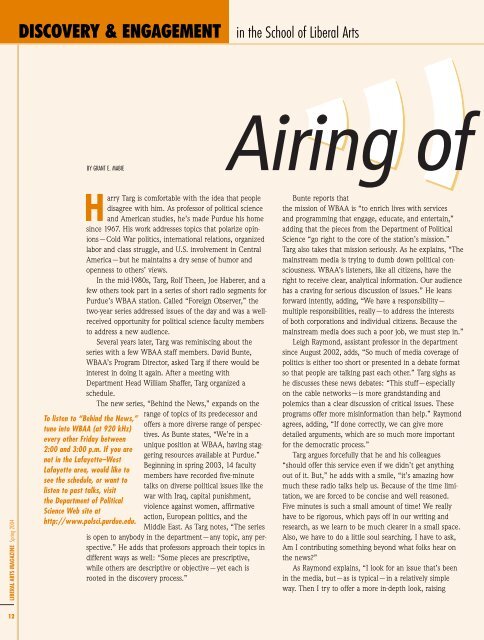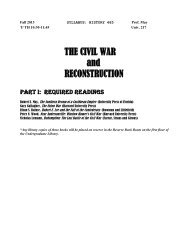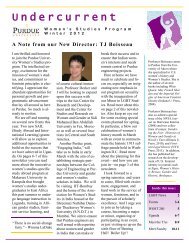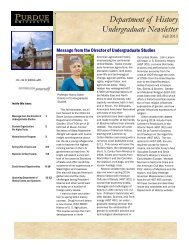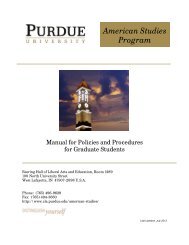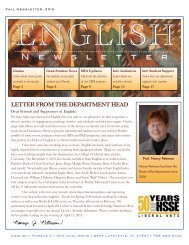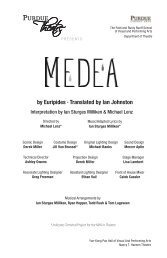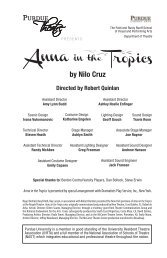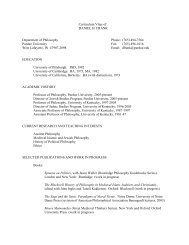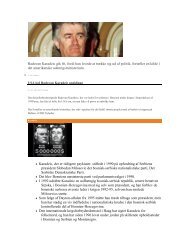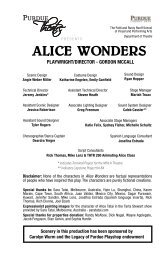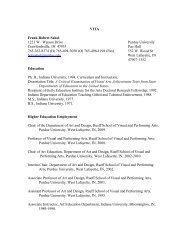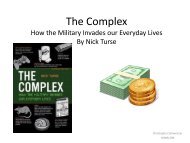Discovery & Engagement Discovery & Engagement
Discovery & Engagement Discovery & Engagement
Discovery & Engagement Discovery & Engagement
Create successful ePaper yourself
Turn your PDF publications into a flip-book with our unique Google optimized e-Paper software.
LIBERAL ARTS MAGAZINE Spring 2004<br />
12<br />
DISCOVERY & ENGAGEMENT in the School of Liberal Arts<br />
BY GRANT E. MABIE<br />
Harry Targ is comfortable with the idea that people<br />
disagree with him. As professor of political science<br />
and American studies, he’s made Purdue his home<br />
since 1967. His work addresses topics that polarize opinions—Cold<br />
War politics, international relations, organized<br />
labor and class struggle, and U.S. involvement in Central<br />
America—but he maintains a dry sense of humor and<br />
openness to others’ views.<br />
In the mid-1980s, Targ, Rolf Theen, Joe Haberer, and a<br />
few others took part in a series of short radio segments for<br />
Purdue’s WBAA station. Called “Foreign Observer,” the<br />
two-year series addressed issues of the day and was a wellreceived<br />
opportunity for political science faculty members<br />
to address a new audience.<br />
Several years later, Targ was reminiscing about the<br />
series with a few WBAA staff members. David Bunte,<br />
WBAA’s Program Director, asked Targ if there would be<br />
interest in doing it again. After a meeting with<br />
Department Head William Shaffer, Targ organized a<br />
schedule.<br />
The new series, “Behind the News,” expands on the<br />
range of topics of its predecessor and<br />
offers a more diverse range of perspectives.<br />
As Bunte states, “We’re in a<br />
unique position at WBAA, having staggering<br />
resources available at Purdue.”<br />
Beginning in spring 2003, 14 faculty<br />
members have recorded five-minute<br />
talks on diverse political issues like the<br />
war with Iraq, capital punishment,<br />
violence against women, affirmative<br />
action, European politics, and the<br />
Middle East. As Targ notes, “The series<br />
is open to anybody in the department—any topic, any perspective.”<br />
He adds that professors approach their topics in<br />
different ways as well: “Some pieces are prescriptive,<br />
while others are descriptive or objective—yet each is<br />
rooted in the discovery process.”<br />
To listen to “Behind the News,”<br />
tune into WBAA (at 920 kHz)<br />
every other Friday between<br />
2:00 and 3:00 p.m. If you are<br />
not in the Lafayette–West<br />
Lafayette area, would like to<br />
see the schedule, or want to<br />
listen to past talks, visit<br />
the Department of Political<br />
Science Web site at<br />
http://www.polsci.purdue.edu.<br />
Bunte reports that<br />
the mission of WBAA is “to enrich lives with services<br />
and programming that engage, educate, and entertain,”<br />
adding that the pieces from the Department of Political<br />
Science “go right to the core of the station’s mission.”<br />
Targ also takes that mission seriously. As he explains, “The<br />
mainstream media is trying to dumb down political consciousness.<br />
WBAA’s listeners, like all citizens, have the<br />
right to receive clear, analytical information. Our audience<br />
has a craving for serious discussion of issues.” He leans<br />
forward intently, adding, “We have a responsibility—<br />
multiple responsibilities, really—to address the interests<br />
of both corporations and individual citizens. Because the<br />
mainstream media does such a poor job, we must step in.”<br />
Leigh Raymond, assistant professor in the department<br />
since August 2002, adds, “So much of media coverage of<br />
politics is either too short or presented in a debate format<br />
so that people are talking past each other.” Targ sighs as<br />
he discusses these news debates: “This stuff—especially<br />
on the cable networks—is more grandstanding and<br />
polemics than a clear discussion of critical issues. These<br />
programs offer more misinformation than help.” Raymond<br />
agrees, adding, “If done correctly, we can give more<br />
detailed arguments, which are so much more important<br />
for the democratic process.”<br />
Targ argues forcefully that he and his colleagues<br />
“should offer this service even if we didn’t get anything<br />
out of it. But,” he adds with a smile, “it’s amazing how<br />
much these radio talks help us. Because of the time limitation,<br />
we are forced to be concise and well reasoned.<br />
Five minutes is such a small amount of time! We really<br />
have to be rigorous, which pays off in our writing and<br />
research, as we learn to be much clearer in a small space.<br />
Also, we have to do a little soul searching. I have to ask,<br />
Am I contributing something beyond what folks hear on<br />
the news?”<br />
As Raymond explains, “I look for an issue that’s been<br />
in the media, but—as is typical—in a relatively simple<br />
way. Then I try to offer a more in-depth look, raising


